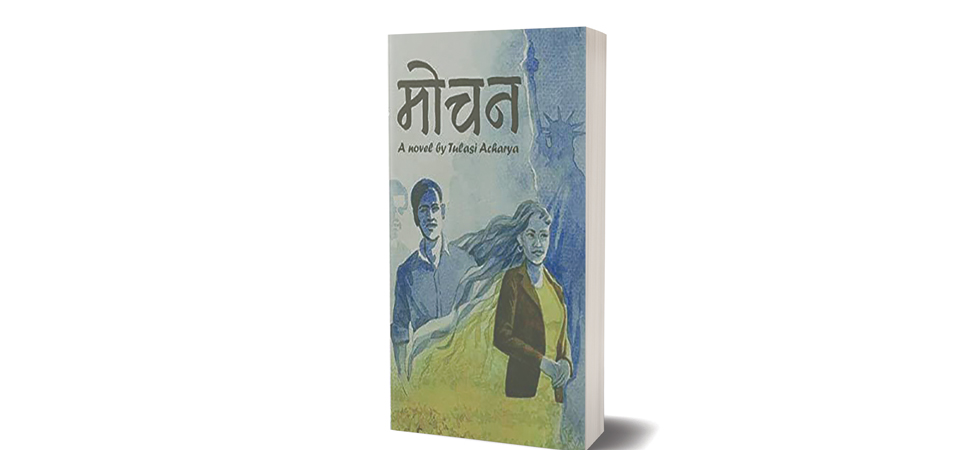As Life Is

Amazon has listed this book as an action-packed Nepali novel on the duality of love, life and the relationship between two continents, leading to meditation and resolution. While quite a mouthful and a tad bit exaggerated, this summary does reflect the medley that is the book ‘Mochan’ by Tulasi Acharya.
Having previously written ‘Running from the Dreamland’, ‘Mochan’ is Acharya’s second novel and his first work in the Nepali language. Now, many authors would take the safe route for their first works, try to appeal to the largest possible audience and choose a topic that the readers are both familiar and comfortable with. However, Acharya is not many authors it seems because he has experimented with his very first novel in his native language.
Right from the title, he subverts the reader’s expectations. Mochan, in Nepali, means liberation, used to denote the absolution of an individual’s sins. However, the main character of this book does not absolve himself of his sins but rather revels in them finding happiness through them. Here, the title Mochan does not refer to a person's emancipation from worldly pleasures, but rather his freedom from unhappiness through an act considered corrupt by our society – an extra-marital relationship.
And therein lies one of the greatest strengths of this book. It forces the reader to think. Is it a sin if it makes us happy? Can an act be called sinful if it helps us escape a miserable existence and find a reason to live? What defines a sin anyway, or rather, who defines it? When do we get to decide to be in charge of our joy? In just 251 pages, Acharya gives us an incredibly detailed look at our morality without being the tiniest bit preachy.
Another thing that the book does well is packaging a lot of serious topics without being dense or disorienting. Love, lust, hate, endurance, patience, dilemma, abuse, conflict, relationship and what have you, Acharya seems to throw everything but the kitchen sink in this story and yet, it does not burden the reader. It is not a chore to have to follow so many plot threads because they are not a tangled mess. It speaks volumes about Acharya's abilities as a writer that he can deliver so much so clearly. The editor, if one is present, deserves credit too.
‘Mochan’ also avoids extremes. No character is simply good or bad, nothing is black and white. Everyone and everything is grey, as it should be. Asma, the first wife of the protagonist Jeevan, is not only a wicked woman who torments her husband for the fun of it. She has other layers to her character; she has emotion; her actions, disagreeable as they may be, are shown to come from a place of love. Similarly, Jeevan is not just an innocent victim. He also has interests and chooses to pursue a relationship with another woman outside his marriage. Every individual in this novel has good and bad traits, as people do in real life. No one is portrayed as a saint or a demon. They are just people, who have desires, passion and want more from life than they are getting. Acharya chooses to add nuance to his personae which make the novel realistic.
However, one cannot help but feel that the author tries to force this realism on the story on occasions. This is most noticeable in the language the characters use. Yes, literature is a reflection of society and the words that the characters in this novel use are not something that we do not hear from our peers in real life. But that should not be an excuse for a formal literary work to use it willy-nilly. Because in addition to reflecting society, literature also reflects on society. People learn what is and is not acceptable from it and when authors like Acharya use it in their works, it sends the message that such terms are tolerable in public discourse.
The author has claimed in news interviews to have used Parijat’s ‘Blue Mimosa’ as the starting point for this novel and it shows. This novel, like Parijat’s works, depicts both hope and despair, often simultaneously, and, rather pessimistically, celebrates the low points of life and failure of relationships. But that is what makes this book unique and able to offer a different perspective to people.
Acharya makes a conscious effort to include the themes of sex and gender in Mochan, which cannot help but make readers familiar with his oeuvre tie it to the author’s 2019 non-fiction title ‘Sex, Gender and Disability.’
Recent News

Do not make expressions casting dout on election: EC
14 Apr, 2022
CM Bhatta says may New Year 2079 BS inspire positive thinking
14 Apr, 2022
Three new cases, 44 recoveries in 24 hours
14 Apr, 2022
689 climbers of 84 teams so far acquire permits for climbing various peaks this spring season
14 Apr, 2022
How the rising cost of living crisis is impacting Nepal
14 Apr, 2022
US military confirms an interstellar meteor collided with Earth
14 Apr, 2022
Valneva Covid vaccine approved for use in UK
14 Apr, 2022
Chair Prachanda highlights need of unity among Maoist, Communist forces
14 Apr, 2022
Ranbir Kapoor and Alia Bhatt: Bollywood toasts star couple on wedding
14 Apr, 2022
President Bhandari confers decorations (Photo Feature)
14 Apr, 2022









